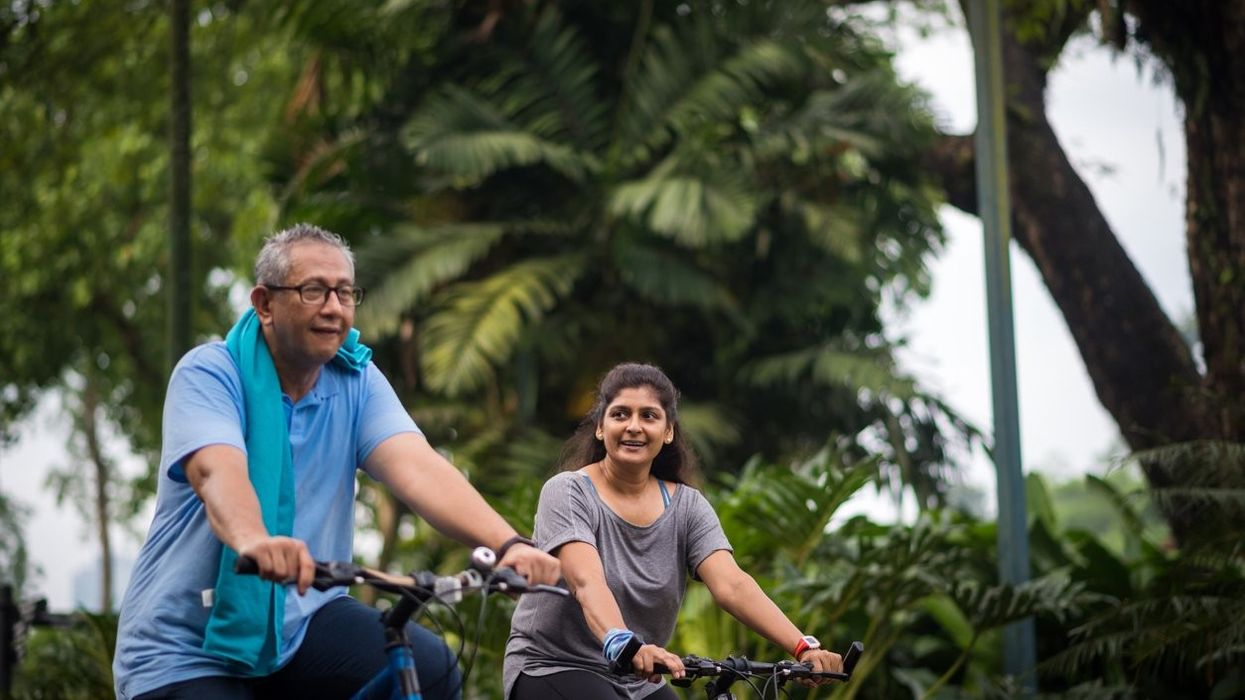BRITISH Asians are at a greater risk of health problems after government figures showed that they continue to do less exercise than other groups.
The percentage of people from a south Asian background doing at least 150 minutes of moderate or intense physical activity a week was 55 per cent, below the national average in the UK of 63 per cent.
While the figure of 55 per cent for 2022 was higher than in the previous two years, it is still lower than the black, Chinese, white British, white other as well as mixed race communities.
Gurch Randhawa, professor of diversity in public health at the University of Bedfordshire, said its research highlights the need to develop culturally competent opportunities to use green spaces, and undertake physical activity.
He told Eastern Eye: “There is a plethora of research demonstrating lower rates of physical activity among minority ethnic communities in the UK.

“The reasons for this are multi-factorial – relating to environmental barriers, socio-economic barriers, and for some, cultural barriers.
“Indeed, in our recent University of Bedfordshire research paper published [in February] relating to a study commissioned by Chilterns Conservation Board – we undertook one of the UK’s largest surveys across two ethnically diverse towns in southeast England investigating green space usage, including activities and reasons for using green spaces.
“The findings revealed that older people, those with higher levels of deprivation and those from a minority ethnic background were all shown to be the lowest users of green spaces.”
The data, published in January by the Department for Digital, Culture, Media and Sport, also showed that 59.6 per cent of men of south Asian origin were physically active, with the figure dropping to 49.7 per cent for Asian women.
And among those aged between 16 and 74 years, people from an Asian background were less likely than average to be physically active.
The age group most likely to do at least 150 minutes of weekly intense physical activity was in the 16-24 category.
Dr Kiran Patel, chief medical officer and a consultant cardiologist at University Hospital Coventry and Warwickshire NHS Trust, warned it was imperative to have a healthy approach to exercise.
He told Eastern Eye: “Many of us struggle to achieve this level of exercise [150 minutes a week], but in the absence of a health condition which prevents exercise, we must aim to motivate ourselves to get going. Start slowly and build up gradually.”
Patel added: “There are many reasons given by the south Asian community as to why they are unable to exercise, such as lack of facilities, lack of same-sex classes, poor motivation, inadequate time and many more reasons.
“Whatever the reason, we must encourage ourselves and each other to undertake exercise to improve our mental and physical health. The benefits are vast, including reducing the risks of diabetes and heart problems.”
The statistics also showed people from an Asian background were less likely to be physically active than the average for every socio-economic group, including managerial and professional jobs, except in the long-term unemployed group.
And people of south Asian heritage were less likely than average to be physically active in all regions except for the northeast and southwest, where sample sizes there were too small to make reliable conclusions.
Regina Giblin, a senior cardiac nurse at the British Heart Foundation charity, said it funded projects which show that south Asians in the UK are at a higher risk of developing type 2 diabetes or high blood pressure compared to white Europeans.
Giblin added: “Patients with diabetes or high blood pressure are more likely to later have heart failure, dementia, heart attacks or strokes than those who don’t have the disease. It is believed this higher risk is partly down to genetics and research is continuing in this area.
“However, it may also be down to lifestyle, and clearly, exercise is good for your heart health whatever your ethnicity.
“ Exercise can help everyone live a healthier life, and can reduce your risk of developing heart and circulatory disease as well as help control blood sugar. Regular movement helps maintain a healthy weight and can reduce your blood pressure and cholesterol. It’s also important to work on your balance and flexibility with exercise such as Pilates.”
Harmander Singh, a running coach from east London who has done more than 150 marathons, said: “There’s no one to help guide England Athletics in their projects to break down barriers [in Asian communities]. You have got to be within it to change. There are too many layers by management.”
Singh added: “Parkrun is much more inclusive, it is free and encourages volunteers. Out of 456 Parkruns I have done, I have volunteered 282 times, from a marshall to time keeper.”
A separate study said exercise should be a “core treatment” for people with depression as some forms are just as good as therapy. Walking, jogging, yoga and strength training appeared to be more effective than other types of exercises, according to the findings published in the British Medical Journal in February.
And the more vigorous the activity, the better, according to the research team led by academics in Australia.
Low intensity exercises such as walking and yoga had meaningful benefit. But when exercise was combined with antidepressants, this improved the effect of the drugs, the research suggested.




